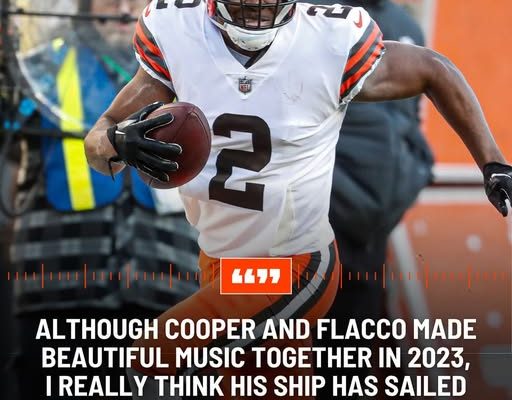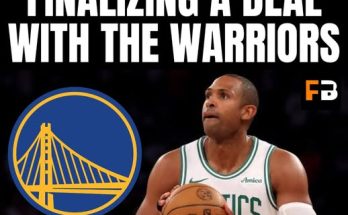The Cleveland Browns have never been short on drama, intrigue, and unexpected storylines, but the recent speculation surrounding Amari Cooper’s potential return to Cleveland has managed to stir a unique wave of chatter among fans and insiders. For weeks now, various reports and online debates have fueled the notion that a reunion between the Browns and their former star receiver could be on the horizon. Cooper, who cemented his place as one of the league’s premier route runners during his time in Cleveland, was traded to the Buffalo Bills in a headline-making move that shocked many around the NFL. The trade, which brought in the draft pick that eventually landed quarterback Dillon Gabriel, signaled both an end of an era and the start of a new chapter for the Browns’ offense. Yet, despite Cooper’s historic performances during his tenure in Cleveland—including back-to-back 1,000-yard seasons and a jaw-dropping 265-yard game that set a franchise record—Browns insider Tony Grossi has firmly dismissed any rumors of the receiver’s return, saying bluntly, “His ship has sailed out of Cleveland.”
Grossi, known for his close ties to the Browns organization and his often brutally honest assessments, made the remark during a recent appearance on Cleveland radio, where he discussed the team’s offseason priorities and the rumors that continue to swirl around potential acquisitions. “Look, I understand why fans are talking about Amari,” Grossi said. “He was a phenomenal player for this team. He gave them stability at wide receiver when they needed it most. But the idea that the Browns are even thinking about bringing him back? That’s just not realistic. His ship has sailed out of Cleveland, and it’s time for everyone to move on.” For a fan base that still feels the sting of Cooper’s departure, Grossi’s words felt like both a reality check and a harsh reminder of how quickly the NFL moves on from even the brightest stars.
To understand why these reunion rumors persist, one has to look back at Cooper’s impact in Cleveland and how his departure left a void that has yet to be completely filled. When the Browns acquired Cooper from the Dallas Cowboys, there were some who questioned whether the move would truly elevate Cleveland’s offense. Cooper quickly silenced the doubters. In his very first season with the Browns, he racked up over 1,100 receiving yards despite inconsistent quarterback play and a run-heavy offense. His precise route running, reliable hands, and ability to create separation made him the go-to target in clutch situations. The following year, he proved that his success was no fluke, posting another 1,000-yard campaign and showcasing his ability to dominate even against elite defensive backs.
But it was Cooper’s record-breaking 265-yard performance in a late-season game that truly cemented his place in Browns history. That game wasn’t just about the yards; it was about the way he completely took over, breaking coverage after coverage and delivering highlight-reel catches that left fans in awe. It was a performance that felt like a statement—both from Cooper and from the Browns—that they were on the cusp of something special. Yet, only months later, the team shocked the NFL world by trading him to Buffalo in exchange for a high draft pick. That pick, as it turned out, was used to select quarterback Dillon Gabriel, a move that the Browns’ front office believes will pay long-term dividends, but which also signaled a clear shift in the team’s priorities.
In hindsight, the trade was as much about timing and financial maneuvering as it was about roster construction. Cooper was entering the final stretch of his contract, and the Browns were facing tough decisions on where to allocate their resources. With big money already tied up in Deshaun Watson and other core players, the front office decided that investing heavily in a veteran receiver was not the way forward. Instead, they chose to pivot toward building around young talent and giving Gabriel—who they see as a potential franchise quarterback—the tools and time to develop. As general manager Andrew Berry explained at the time, “These are tough decisions, but we believe this move positions us best for sustained success.”
Still, for many Browns fans, the emotional attachment to Cooper lingers. It’s not every day that Cleveland has a receiver who can consistently dominate defenses and produce highlight performances. Cooper’s professionalism, quiet confidence, and work ethic endeared him to the fan base in a way that few players have managed in recent years. His connection with teammates was strong, and he often served as a calming presence in a locker room that has seen its fair share of chaos. The trade, while logical from a business standpoint, left a bitter taste for those who believed that Cooper was still a key piece in the Browns’ puzzle.
This is why the recent whispers of a potential reunion have gained traction. Reports out of Buffalo have suggested that Cooper, while still performing at a high level, is open to exploring new opportunities once his current contract ends. Some have speculated that he might be intrigued by the idea of returning to Cleveland, especially given his fondness for the city and the relationships he built there. Social media has only amplified these rumors, with fans posting highlights of Cooper’s best Browns moments and tagging both him and the team in hopes of sparking some kind of dialogue.
However, Grossi’s comments have thrown cold water on these hopes. “Look, the Browns made their decision, and Cooper has moved on,” Grossi said. “He’s in a great situation in Buffalo right now, catching passes from one of the best quarterbacks in the league in Josh Allen. And the Browns? They’re building something new. They’re not looking back, and they’re certainly not planning to bring in a player they just traded away, especially when they’re trying to develop a young quarterback. It doesn’t make sense.” Grossi’s point is not without merit. The Browns’ focus is now squarely on the future, and that future is tied to Dillon Gabriel, the rookie quarterback who has already shown flashes of promise in offseason workouts and preseason action. The organization wants to surround Gabriel with young, dynamic playmakers who can grow with him, rather than relying on veteran stars who may not fit the timeline.
Even so, the narrative around Cooper is hard to ignore, largely because his success since leaving Cleveland continues to make headlines. In Buffalo, he has seamlessly slotted into a potent offense, forming a deadly duo with Stefon Diggs and giving the Bills yet another weapon in their quest for a Super Bowl. His ability to produce big plays hasn’t diminished, and in some ways, the trade has only highlighted how valuable he truly was to the Browns. For Cleveland fans watching from afar, it’s bittersweet to see Cooper thriving elsewhere while their own passing game still works to find consistency.
The discussion around Cooper also raises broader questions about the Browns’ long-term strategy and their ability to build a sustainable contender. Trading away a proven star receiver in the prime of his career is a risky move, even if it nets a promising young quarterback. The Browns have been here before—banking on potential while letting established talent walk away—and the results haven’t always been favorable. Critics have argued that the team should have found a way to keep Cooper while still drafting Gabriel, but the financial and roster dynamics made that a difficult proposition. Berry and head coach Kevin Stefanski have emphasized the importance of building a balanced roster, one that isn’t overly dependent on any single player. In their view, the departure of Cooper is a necessary step toward achieving that balance.
Yet, no matter how much logic and strategy is behind the decision, the emotional connection between fans and players often tells a different story. Cooper’s highlights are still fresh in the minds of those who watched him light up opposing defenses. The thought of him returning to don the brown and orange again is a tantalizing one, even if it’s more fantasy than reality. “I get it,” Grossi admitted. “Fans love their stars. They want to believe that maybe, just maybe, the team will have a change of heart. But this isn’t Hollywood. This is the NFL. Once a player moves on, especially after a trade like that, the odds of a reunion are slim to none.”
Interestingly, some players within the Browns locker room have also weighed in on the topic, though more subtly. Several current players have publicly praised Cooper’s work ethic and leadership, noting that his presence was invaluable during his time in Cleveland. Wide receiver Elijah Moore, for example, spoke recently about how much he learned from Cooper during their time together. “Amari’s one of the best I’ve ever seen at running routes,” Moore said. “Just watching him work, how he studies the game, how he approaches each week—it was a masterclass. I still take those lessons with me every day.”
This sense of respect among players only fuels the narrative that perhaps the Browns made a mistake by moving on too soon. But as Grossi and others have pointed out, the NFL is a league driven by tough choices and constant change. The Browns are betting that the combination of Gabriel’s potential, a retooled receiving corps, and a strong running game will be enough to keep them competitive. Whether that gamble pays off remains to be seen, but one thing is certain: the conversation around Amari Cooper isn’t going away anytime soon.
As for Cooper himself, he has remained largely silent on the topic of a potential return. He has expressed nothing but gratitude for his time in Cleveland, often speaking highly of the fans and the organization. In interviews since joining the Bills, he has emphasized his excitement about the opportunity to play in Buffalo and compete for a championship. “I had a great time in Cleveland,” Cooper said during a preseason press conference. “The fans there are incredible, and I’ll always appreciate my time with the Browns. But right now, I’m focused on what we’re building here in Buffalo. That’s where my head is at.”
Despite this, every big performance from Cooper—every game where he racks up 100 yards or makes a game-changing play—sparks fresh conversations among Browns fans. They can’t help but wonder what the offense would look like with him still in the fold, catching passes from Gabriel or even Watson in certain packages. It’s a what-if scenario that lingers, much like the what-ifs that have defined much of the Browns’ modern history.
The road ahead for Cleveland is both promising and uncertain. Gabriel’s development will be key, as will the ability of the Browns’ current receiving corps to step up and deliver. Players like Elijah Moore, Donovan Peoples-Jones, and rookie wideout Trevon McMillan will need to fill the void left by Cooper, both in terms of production and leadership. The front office has shown confidence in this group, but it’s clear that they will be under the microscope as the season unfolds.



